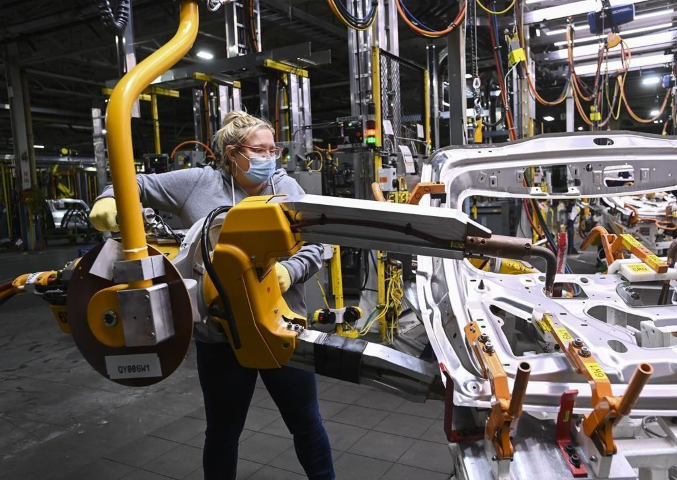
A GM worker uses human assistance automation to weld vehicle doors at the General Motors assembly plant during the COVID-19 pandemic in Oshawa, Ont., on Friday, March 19, 2021. THE CANADIAN PRESS/Nathan Denette
Companies in the manufacturing sector are increasingly focusing on strategies to attract and retain female employees, recognizing the importance of diversity in addressing labor shortages within the industry.
A recent three-day forum organized by the Canadian Manufacturers and Exporters highlighted the significance of training, flexibility, and benefits in drawing women into manufacturing roles. This initiative coincided with the approaching International Women's Day, emphasizing the sector's commitment to gender diversity.
While the proportion of women in manufacturing reached over 29% in 2022, marking a significant increase over four decades, the industry still falls short of achieving gender parity seen across the wider Canadian workforce.
Dennis Darby, CEO of the Canadian Manufacturers and Exporters, stressed the need for proactive measures to increase female representation in manufacturing, setting a target of 100,000 women in the sector by 2030, aiming for a third of the Canadian manufacturing workforce.
As manufacturers grapple with skill shortages and the retirement of experienced workers, talent attraction remains a pressing challenge. Taneris Canada, a pipe manufacturing company, has been actively engaging with educational institutions and local communities to showcase manufacturing career opportunities. Initiatives like open-door tours have proven effective in shifting perceptions and generating interest among young individuals.
Furthermore, Tenaris Canada has implemented inclusive policies to enhance female representation in leadership roles, achieving full female leadership at its service center in Grand Prairie, Alta., and a more balanced gender ratio in its Canadian leadership team.
According to Liza Vityuk of McKinsey & Co., fostering diversity and inclusion should be integral to corporate strategies, as diverse companies tend to outperform peers in various aspects. Recognizing gender-specific needs, such as providing ergonomic equipment, is vital in creating a supportive work environment for women.
Julie Savard-Shaw, Executive Director of The Prosperity Project, highlighted the importance of addressing microaggressions and creating psychologically safe workplaces, particularly for women from marginalized backgrounds.
Honda Canada and StandardAero are among the companies actively working to bridge gender gaps and enhance diversity and inclusion initiatives. Honda Canada is focusing on technology-driven solutions to eliminate biases, while StandardAero is introducing initiatives like maternity and parental top-up leave to support women in aerospace roles.
While progress has been made, challenges remain, including the need for greater flexibility in production environments and addressing biases inherent in traditional workplace structures. Nevertheless, concerted efforts by manufacturers are paving the way for a more inclusive and diverse industry landscape.















